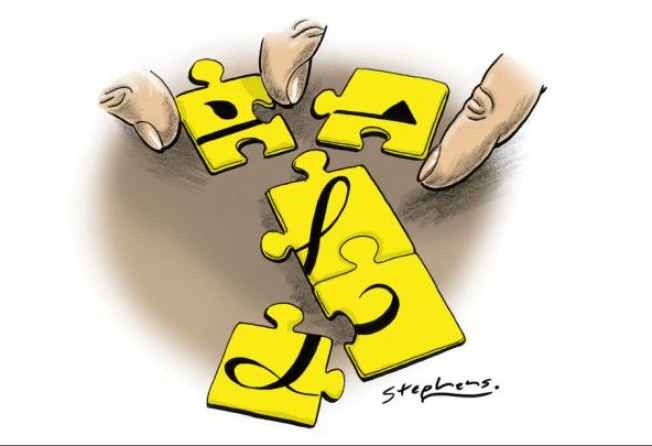New-look Legco bodes ill for government
Joseph Wong says with disunity even among pro-establishment forces in the new Legco, plus the rise of radicals, the government will have a tough time pushing through its policies

It may be easy to conclude from the outcome of the Legislative Council election that the pro-establishment forces have been strengthened. A staunch supporter of the government, the Democratic Alliance for the Betterment and Progress of Hong Kong, is the biggest winner in the election, taking a total of 13 seats, with nine in the geographical constituencies, while the Democratic Party won only four directly elected seats, compared with seven in 2008.
Although the pan-democrats secured over 55 per cent of the popular vote, they managed to get only 18 seats in the expanded 35-seat geographical constituencies. This disproportionate outcome is mainly due to the success of the disciplined vote-splitting strategy perfected by the DAB in this election. For example, each of its two candidate-lists in Hong Kong Island and three lists in the New Territories West got enough votes to win a seat.
In contrast, the Civil Party's strategy, adopted to good effect in the last election, was to put the popular candidate as No 2 on two lists. This time, the strategy failed to win the second seat for Tanya Chan and Audrey Eu Yuet-mee under the largest remainder formula.
The apparent setback of the pan-democrats in the geographical constituency election deserves closer examination. There is no doubt many Democratic Party supporters were disappointed with its past performance, and this had an impact on the dynamics of the pandemocrat camp. For example, Gary Fan Kwok-wai, who left the Democrats to set up the NeoDemocrats, won the last seat in New Territories East, while the incumbent Democratic Party member, Wong Sing-chi, lost by a wide margin.
The People Power party, led by Wong Yuk-man, almost succeeded in doubling its number of seats to four. While its first-time candidate Wong Yeung-tat lost the last seat by fewer than 2,000 votes, another member, Raymond Chan Chi-chuen, won comfortably in New Territories East, getting more votes than, say, the Civic Party's Ronny Tong Ka-wah.
In the same district, "Long Hair" Leung Kwok-hung of the League of Social Democrats received the most votes of any candidate in that constituency. Combined, these two radical democrat groups received more votes than the Democratic Party in the geographical constituencies.
Although many voters deserted the Democratic Party and the Association for Democracy and People's Livelihood (ADPL) in the geographical constituency election, even taking away the ADPL's one seat in Kowloon West, they were rational enough to support their three lacklustre candidates in the District Council (second) functional constituency election.
This particular election is symbolic in two ways. First, it is a one-person-one-vote election open to some three million voters in Hong Kong. Second, it is essentially a three-on-three match between the pan-democrats and the pro-establishment faithful in the DAB and the Federation of Trade Unions (FTU). The three democratic candidates were united in championing the cause of safeguarding Hong Kong's core values, which they regarded as being under siege by the central government and the Leung Chun-ying administration. The implementation of a national education course in schools, a plan that was abandoned by the government only a day before the election, was cited repeatedly as a brainwashing device in debates.
In the end, the people of Hong Kong gave a 3-2 verdict in favour of the democrats. That Starry Lee Wai-king got in as No 2 on her party list while her DAB senior Lau Kong-wah lost is probably the result of a deliberate split-voting strategy to groom Lee for greater things.
Proof that voters were concerned about protecting such Hong Kong values as the rule of law can be found in the election results of the traditional functional constituencies. In the legal constituency, the 34-year old Civic Party barrister Kwok Wing-hang beat the seasoned solicitor Albert Wong Kwai-huen hands down.
In the information technology constituency, pan-democrat Charles Mok, who lost at the last election, returned with a vengeance and secured 40 per cent more votes than his pro-establishment rival Tam Wai-ho. And the accountancy constituency, a traditional stronghold for the pro-establishment camp, now has a pan-democrat representative in Kenneth Leung Kai-cheong, leaving many to wonder whether the endorsement by the unpopular Secretary for Development Paul Chan Mo-po turned out to be the kiss of death for the once favourite candidate, Nelson Lam Chi-yuen.
Overall, the election results won't make it easier for the government to implement its agenda. That the pan-democrats hold a majority, albeit by one, in the geographical constituency group means that any attempt to amend the Standing Orders of the Legislative Council to prohibit or restrict the unruly behaviour or delaying tactics of the radical members will not succeed under the separate voting procedure.
That the pan-democrats hold 27 seats, more than a third of the total number of 70 seats, means further electoral reform towards universal suffrage will be intensely scrutinised. Having paid a huge price for compromising on the last occasion, the Democratic Party can't afford another demonstration of pragmatism or weakness.
If the pan-democrats are divided, the winning pro-establishment members are far from united. The New People's Party, now with two seats, voted down Leung's attempt to fast-track the reorganisation proposal. The Liberal Party's James Tien Pei-chun, who will return to Legco after a four-year break, is not a Leung supporter. Even the FTU and the DAB would think twice before supporting any unpopular policies proposed by the government. The anti-national education movement worried them a lot until the government backed down.
With the election over, the chief executive should lose no time to map out a strategy of co-operation with the new Legco members and regain the people's trust.
Joseph Wong Wing-ping, formerly secretary for the civil service, is a visiting professor at City University of Hong Kong